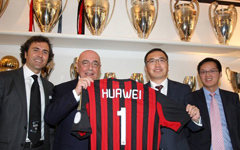Huawei and Arsenal team up to gun for success
By Mike Bastin (China Daily) Updated: 2014-02-11 07:17Of course, strategic brand-building starts with a solid, reliable reputation for the highest product and service quality standards. But while this is, and always will be, a necessity, it is rarely sufficient in building a lasting, sustainable competitive advantage. Increasingly emotional forms of brand association are required in order to build such competitive advantages. Sport often provides an extremely important element toward this end.
Huawei's partnership with one of Europe's, if not the world's, leading soccer clubs is, therefore, a perfect example of excellent strategic thinking.
|
 |
As a result, Arsenal's brand image conjures up associations such as "exclusive", "superior" and "authoritative" as well as the values common to other successful sports clubs such as "exciting", "stylish" and "fun". The club's nickname is The Gunners.
In a nutshell, Arsenal Football Club is the "gentleman" of UK and European soccer. Arsene Wenger, the head coach for the past 16 years, has reinforced this perception significantly with his suave appearance and effortlessly erudite manner.
This tie-up is, therefore, highly likely to contribute to Huawei's position in the smartphone market very positively with a contrasting combination of a young and lively image as well as one of maturity, decency and, above all, trust.
It is also of strategic importance that the deal allows Huawei to access Arsenal's fan base directly via the club's customer data base. Far deeper engagement with the Huawei brand and future developments will become a key feature of future marketing initiatives.
At precisely the time when the "low cost, low price" business model, for so long a central plank in numerous Chinese businesses' corporate strategies, requires replacement with a more sustainable "high quality, high value-added, premium brand" approach, Huawei's international brand-building strategy should be followed and repeated by other aspiring Chinese companies.
Expect more strategic and creative brand associations from Huawei and its management team as we enter the age of the international Chinese brand.
The author is a visiting professor at the University of International Business and Economics, Beijing, and a senior lecturer at Southampton Solent University's school of business.
- NHTSA says finds no 'defect trend' in Tesla Model S sedans
- WTO rare earth ruling is unfair
- Amway says 2014 China sales may grow 8%
- President Xi in Europe: Forging deals, boosting business
- CNOOC releases 2013 sustainability report
- Local production by Chery Jaguar Land Rover this year
- Car lovers test their need for speed in BMW Mission 3
- China stocks close mixed Monday

















